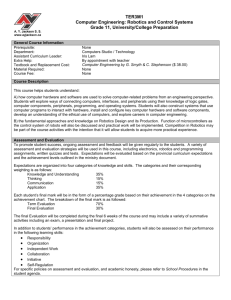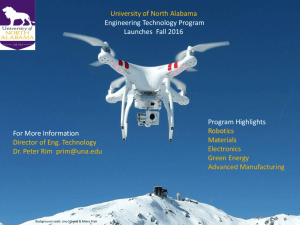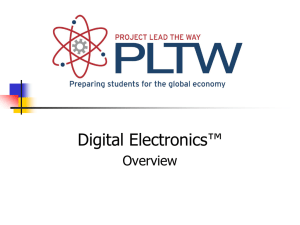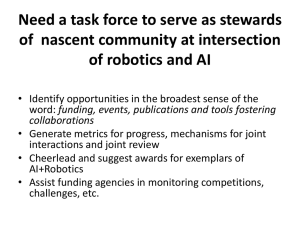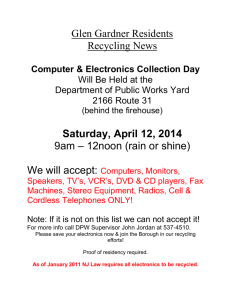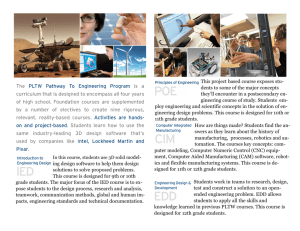Digital Electronics, Microcontrollers, and Robotics
advertisement
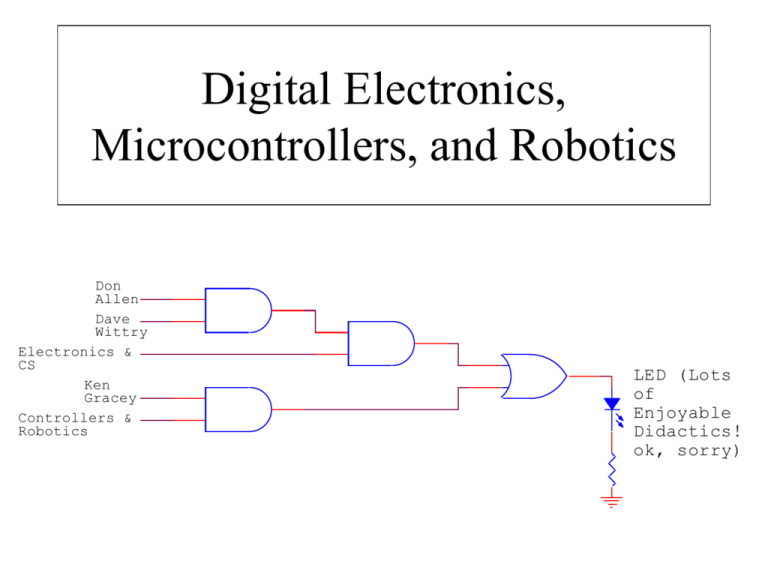
Digital Electronics, Microcontrollers, and Robotics Don Allen Dave Wittry Electronics & CS Ken Gracey Controllers & Robotics LED (Lots of Enjoyable Didactics! ok, sorry) 1 Digital Electronics, Microcontrollers, Robotics Outline • Who – Dave Wittry & Don Allen (Troy), Ken Gracey (Parallax) • Why – show you enough fun things that you might want to start/add to a class • Game plan – ICT, Microcontroller Course, Parallax • www.troyhigh.com/wittry – all info today can be found here • docs, this presentation, more… (for tests/quizzes, contact us) 2 Digital Electronics, Microcontrollers, Robotics ICT • History of the development of the class. • from general electronics to digital/computer electronics • the infusion of ACSL-like topics 3 Digital Electronics, Microcontrollers, Robotics A bit - about - the bits … that make up the class 4 Digital Electronics, Microcontrollers, Robotics Numbering Systems (1.5 weeks) • conversions: Baseany BaseanyOther • addition/subtraction 5 Digital Electronics, Microcontrollers, Robotics Logic gates (3 weeks) • AND, OR, NOT, NAND, NOR, XOR, XNOR • wiring the labs – breadboards, chips, led’s (little exploding devices) • lab sheets/assignments • the lab itself 6 Digital Electronics, Microcontrollers, Robotics Karnaugh (K-Maps), NAND Implementations, Minterms (2 weeks) • method of simplifying boolean algebra expressions 7 Digital Electronics, Microcontrollers, Robotics Boolean Algebra (2 weeks) • basic laws plus some specific only to boolean values • DeMorgan’s Laws 8 Digital Electronics, Microcontrollers, Robotics Door–Goat–Wolf, AirLock, Football Projects • ties all topics to this point together • requirements Project 9 Digital Electronics, Microcontrollers, Robotics Flip-Flops (2 weeks) • RS, RS-clocked, D, J-K • basic building block of shift-registers, counters, memory devices • students find it cool that the same switch combination can result in a different output (output based on last outcome) 10 Digital Electronics, Microcontrollers, Robotics Counters (3 weeks) • up, down, mod-N counters, using a 555timer 11 Digital Electronics, Microcontrollers, Robotics Shift Registers (2 weeks) • left, right, re-circulating • multiplying/dividing by 2 • bit string flicking (ACSL) 12 Digital Electronics, Microcontrollers, Robotics Adders/Subtractors (3 weeks) • ½ adders, full adders, ½ subtractor, full subtractors • 1’s and 2’s Complement, integer math • binary multiplication 13 Digital Electronics, Microcontrollers, Robotics Equipment costs • Per group (2 students) – – – – breadboard, power supply ($75) 20 chips ($15) wires, template 6 LED’s ($1) • Class set – logic probe ($10), multi-meter ($15) – pliers, cutters, stripers, solder, solder-iron, misc. ($50) 14 Digital Electronics, Microcontrollers, Robotics Programming Microcontrollers & Robotics • History and Motivation for the class – melding of hardware & software – freedom to experiment and have fun with practical labs before it gets serious in college – BS2 sounded like fun and the means to my end – took 2-day educator course from Parallax • great if you’re a newbie to controllers – the curriculum is fun (WAM, BAD, IC, Robotics) 15 Digital Electronics, Microcontrollers, Robotics Programming Microcontrollers & Robotics (cont’d) • much harder to get physical, real-world projects to do exactly what you want (neat!) as opposed to a software (theoretical) class – they’ll need time to experiment and try algorithms • cool thing I learned right away: watch out how much you tell them – they’re smarter/more creative than you! Let them suggest lab ideas and then try some. 16 Digital Electronics, Microcontrollers, Robotics Teaching Style & Prerequisites • if you plan on teaching this type of course using a facilitative approach, keep prerequisites high – 20 students or so – otherwise you’re in for a nightmare with such an independent, self-motivated type curriculum and somewhat expensive hardware – great for middle-schools students as well – this class is LOTS of fun to teach 17 Digital Electronics, Microcontrollers, Robotics The BS2 and How it Works Code Wiring 18 Digital Electronics, Microcontrollers, Robotics Interfacing to the real-world through a variety of devices • limited only by your imagination • Types of devices you can interface to the BasicStamp – almost anything! • simple electronics stuff – plus the more advanced/fun things (sound module, RF receiver/transmitter, video, web server…more from Ken) 19 Digital Electronics, Microcontrollers, Robotics Electronics Component Companies • • • • • http://www.stampsinclass.com (Parallax) http://www.elexp.com/ (Electronix Express) http://www.jameco.com/ (Jameco) http://www.kelvin.com/ (Kelvin) … more; easy to find on web 20 Digital Electronics, Microcontrollers, Robotics Robotics Labs • great curriculum, well-written, nice springboard to bigger better things, great for Back-To-School night • usage of servos, usage of devices already ‘played’ with (potentiometer for direction control, button for go/stop, etc.) (Francisco) 21 Digital Electronics, Microcontrollers, Robotics Robotics Labs (cont’d) • line following (photo-resistors, “TROY” signfollowing • Maze labs (spend as much time as you want here – it’s where they have the most fun) – maze construction/development – floor, walls, costs – one-hallway maze • find way in, ‘report’ at end, find way out • using “whiskers” • using infrared devices 22 Digital Electronics, Microcontrollers, Robotics Robotics Labs (cont’d) • algorithms learned/discovered (careful how much you tell them) • follow-wall-right (quick bit on “Karel”) – spin off idea (stay straight and follow wall) • will be neat to try with Fuzzy Logic concepts • bump-and-turn 23 Digital Electronics, Microcontrollers, Robotics Student-Designed Project • provided you have a budget, let students go through web sites, magazines/catalogs (Parallax, Nuts-And-Volts, Robot Magazine, Mouser, etc.), books and design a project. Limit them as to how much they can spend. Have them “prove” they can make it work then buy materials and have them go at it 24 Digital Electronics, Microcontrollers, Robotics Fuzzy Logic (optional topic) • read a book in an engineering class? boy am I mean! • Bart Kosko’s “Fuzzy Thinking” is a nice, friendly place to start • current technology used in control systems to give smoother, simpler control of complex systems • eventually implement a fuzzy-controlled system with Parallax’s new Java-enabled microcontroller 25 Digital Electronics, Microcontrollers, Robotics

